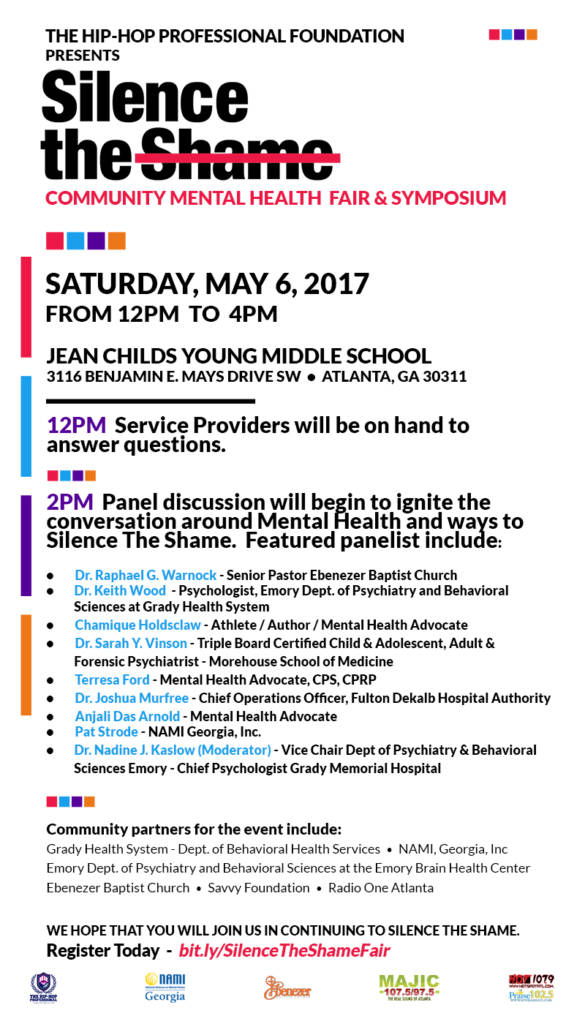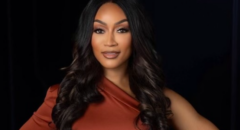There are just some things you can’t just pray away. Sometimes you may need to see a therapist or a psychiatrist and there's nothing wrong with that. The Hip Hop Professional Foundation is launching a new initiative, Silence The Shame, to help remove the stigma that comes with mental illness and start the much-needed conversation in our community.
Known as The Hip Hop Professional, Shanti Das talks about the #SilenceTheShame initiative and how she wants to jumpstart the conversation about mental health in this exclusive interview.
BDO: How did #SilenceTheShame come about?
Shanti Das: I left Motown Records when I was EVP of Marketing in 2009 and I flew back home and started doing a lot of community service. I rebranded myself as The Hip Hop Professional speaking at a lot of colleges, and the mental health portion of my work really came about two years ago. My father committed suicide when I was seven months old and I just never properly dealt with his death until I was an adult. I first went to counseling when I was in my thirties, I’m 46 now, and it really kind of came to a head two years ago. I had a terrible bout of depression in 2015. I went back to counseling, got on anti-depressants and I finally wanted to turn that pain into something positive to help other people. That’s how Shame the Silence was born. I’m finally establishing the foundation as a 5013c and Silence the Shame will be the first initiative from The Hip Hop Professional foundation.
BDO: Why do you think after all this time and talk about mental health that there’s still a stigma with mental health?
Shanti Das: I think, especially in our community in terms of how we socialize, there’s still many negative connotations surrounding mental health. When you think of words that come to mind, people think, “crazy” or “that person isn’t normal.” No one wants to feel like that, especially in this age of social media where it’s about celebrating yourself or putting yourself up on this social pedestal. I think today it’s even more taboo because everyone is trying to be the best that they can be or to compete with the next person and no one really wants to share what’s going on from a negative standpoint in their life.
I do think a few people have started using social media as a positive way to talk about mental health. I think now celebrities are starting to open up and I think everyday folks like myself see celebrities opening up and it’s like, “Why are we afraid to talk about it?” I’m hoping that Silence the Shame will help normalize the conversation and really get people involved. Because I’ve worked in entertainment for so long, I’m trying to use my influence in that area to help get so many more people involved, especially from an African-American standpoint.
This is something very personal for me. My best friend committed suicide a little over three years ago and one of my family members are bipolar. It is very difficult on the family, but one thing I can say is that it’s important for family members talk about it because the more that you try to hide it and keep it hidden, I think the worse it is for the family overall. It’s like you’re constantly trying to live a life that isn’t true and instead of just dealing with it, it becomes a secret. That’s suffocating for everyone involved, especially the person that is suffering.
Mental illness is just like any other sickness. If you have cancer, you go see an oncologist. What’s wrong with going to a therapist or psychiatrist and getting treatment? Of course there are different levels to it. Some cases are more severe than others. Fortunately, I was able to deal with my depression from seeing someone and getting on my anti-depressants, and I was able to eventually ween myself off of it. There are things that I still do on a daily basis to just take care of myself, whether it’s just exercising or eating certain foods that lead to brain health. I just want to help educate the community and work with other organizations such as the National Alliance of Mental Illness (NAMI). They do great work in the community, and I’m doing my first mental health fair in Atlanta on May 6. I have Morehouse School of Medicine on board, as well as some other wonderful people and we hope to jumpstart the conversation even more.
BDO: Last year I went to a therapist for the first time because I was in this weird funk and I realized all I needed to do was talk to someone. I just needed to talk myself through it.
Shanti Das: I’m so glad that you said that. Kudos to you for having the courage to do that because people think mental illness is, “Oh, something is wrong with me.” It can just be taking care of your mental health. Like with you, whatever you were going through, sometimes you just need to talk to someone. Some people may have it more severe where they need to go on medication and possibly be hospitalized, and that’s no different from other cases of diseases. At least you had the wherewithal to deal with it before it became a serious issue. Oftentimes traumatic experiences can lead to depression. There’s a lot of women who go through postpartum depression. Chrissy Teigen talked about postpartum depression just recently and what she had to go through and so many women have experienced it. And it’s not like something is wrong with you, it’s just a chemical imbalance within your brain and sometimes we need a little help to balance it out, or you may just need to talk to people.
I’m a member of a Baptist church here in Atlanta. My pastor was the first one to tell me, "You need to go and talk to someone. You can’t pray your way through this one." Even though I am a Christian and I’m a faithful individual, I’m not perfect but I try to walk by faith, but sometimes you have to realize that you need more than prayer. You may need medication. You may need to see a doctor. We just try to encourage that.
BDO: What advice would you give to someone who has a friend with a mental health disorder?
Shanti Das: The first thing I’ll say is if it’s a really close friend, I think you should have a pretty normal and easy conversation. Be patient with them and ask them what’s going on and what’s wrong. As a friend, you need to see if they are willing to be honest with you and if they’re open. I think oftentimes people have a problem admitting that they even need help or that there is something going on. You should really just be open with them, and don’t be too forceful with them. Allow them to tell you what's going on, and you may need to have more than one conversation. Sometimes it takes two or three conversations for the person to really open up and be honest about what the problems are. Especially people who have more serious disorders because I’ve found that from talking to different people, they don’t want to admit that something is wrong. Do some research as a friend just so you can understand what they’re going through. That’s what I had to do with my family members. I read up on it more so that I can be more compassionate and understanding.
Sometimes as family members or friends, we get frustrated or we think the person should be doing one thing or the other and sometimes they just can’t. They just can’t even think the same way they used to think. I think the number one thing is to not be judgmental. As my mom used to say, until you walk in someone else’s shoes, you really don’t know what they’re going through or what they are experiencing. Mental health is very complex. The other thing I don’t do is I don’t try to play doctor. I do try to understand as much as I can so in order to be able to recommend someone to see a licensed professional.
BDO: Can you tell us about the events that are happening this weekend?
Shanti Das: On May 5th, we’re proclaiming it Silence The Shame Day and that is our global social media push and campaign to get people to really open up and jumpstart the conversation around mental health. We want to see ourselves as the thread in pop culture and really get young people and folks in entertainment not to be embarrassed in talking about mental health. We have a ton of celebrities and faith leaders and people in the community that are going to be sharing their testimonies that day and just posting and sharing using the hashtag #SilencetheShame.
On May 6 we are doing our first mental health fair in Atlanta. It’s actually at my middle school which is really cool because I get to go back into the community to do some work there. We have NAMI Georgia, we have several health care professionals, the Emory School of Medicine, the Morehouse School of Medicine as well as Fulton Dekalb Hospital Authority.
It’s an opportunity for us to bring a lot of professionals together to help the community. It's not just one of those panels where everyone is just sharing their expertise. We really want to talk to the community. From 2-4pm, there will be Q & A and Radio One Atlanta is our media partner. From 12-2pm we’re going to have service providers on hand to answer questions and to pass out fliers. We’re hoping that we get a good turnout and that people will come out to learn more about mental health.










